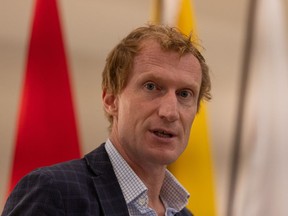
Staff at local post-secondary institutions say they’re closely monitoring the federal government’s plan to reduce the number of international students granted permission to study in Canada.
Advertisement 2
Article content
The two-year cap, announced this week by Immigration Minister Marc Miller, will mean a 35 per cent overall reduction in new study visas though some provinces, including Ontario, will see a reduction of 50 per cent or more.
Article content
The minister hopes the cap will give the federal and provincial government time to curb a system that he says is taking advantage of high international student tuition while providing, in some cases, a poor education.
Miller says the government will also bar students in schools that follow a private public model from accessing postgraduate work permits as of Sept. 1.
And in a few weeks, open work permits will only be available for the spouses of students enrolled in master’s and doctoral programs, as well as professional programs such as medicine and law.
Advertisement 3
Article content
Miller says the federal government will work with provinces, which up to this point have not moved to fix the problem as quickly as he would have liked.
In a statement released on Tuesday, Conestoga College, which has a campus in Brantford, said it’s “concerned about what the announcement will mean for students and local employers in the eight communities we serve.”
“It’s essential to get this right,” said the statement. “We worry the timelines for such substantive changes are too short to engage in the kind of meaningful consultation we need. The announcement has created a great deal of uncertainty. We are committed to putting our students first and want to reduce the anxiety about what this means for them.”
Conestoga’s statement said fall 2024 recruitment is already well underway and such large changes may affect students already in Ontario, as well as those who have applied or already received offers of admission.
Advertisement 4
Article content
“We will actively work with the province to ensure we mitigate the impact on both international and domestic students. The international students we welcome at Conestoga are essential to bringing in top talent for key sectors of our workforce and typically come with an existing diploma or degree so they can move quickly into the labor market.”
Waterloo-based Wilfrid Laurier University, which has had a campus in Brantford for 25 years, has a total student population of 21,132 students, including 1,321 international students.
Vanessa Barrasa, Laurier’s director of communications, said the university is reviewing the announcement.
“We can tell you that student success is at the heart of Wilfrid Laurier University’s internationalization efforts, which are centered on attracting and supporting engaged international students at every step of their academic journey.
Advertisement 5
Article content
“Laurier’s goal is to grow the number of international students while ensuring international student growth is sustainable, ethical and aligned with the student experience the university is known for.”
Kyle Rooks, corporate communications officer for Fanshawe College, which has a campus in Simcoe, said they are reviewing the government announcement and its potential impacts on the college.
A news release issued by the Ministry of Immigration, Refugees and Citizenship Canada, said “in recent years, the integrity of the international student system has been threatened.”
“Some institutions have significantly increased their intakes to drive revenues, and more students have been arriving in Canada without the proper supports they need to succeed.”
Advertisement 6
Article content
The government says rapid increases in the number of international students arriving in Canada also puts pressure on housing and health care.
Barrasa said Laurier offers various supports to international students, including housing and those related to health and wellness.
For 2024, the cap is expected to result in about 360,000 approved study permits. Study permit renewal won’t be impacted. Those pursuing master’s and doctoral degrees, and elementary and secondary education aren’t included in the cap. Current study permit holders won’t be affected.
— With files from The Canadian Press
Article content